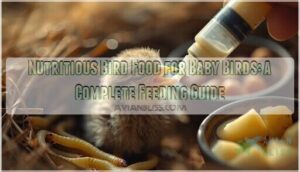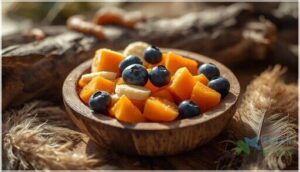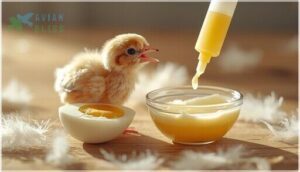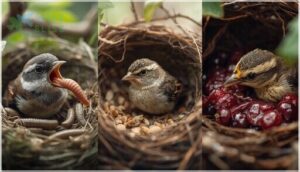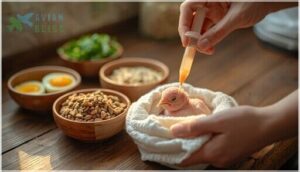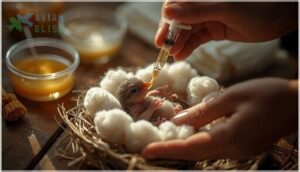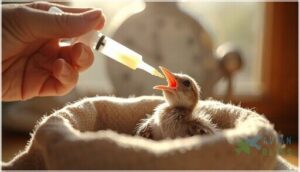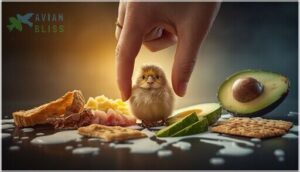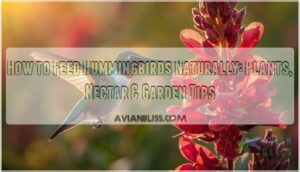This site is supported by our readers. We may earn a commission, at no cost to you, if you purchase through links.
You spot a baby bird on the ground, eyes barely open, mouth gaping for food—and suddenly you’re facing a life-or-death decision with zero preparation. Most people reach for bread or milk, both of which can kill a hatchling within hours.
The harsh truth is that baby birds have remarkable metabolic demands, burning through calories at rates that would make a marathon runner look sedentary, and their bodies can’t tolerate the foods that sustain adult birds, let alone humans.
Getting nutritious bird food for baby birds right means understanding that these fragile creatures need precise ratios of protein, fat, and micronutrients delivered at exact temperatures and intervals.
Whether you’re caring for an orphaned nestling or preparing to assist fledglings during their vulnerable shift to independence, the difference between thriving and failing often comes down to knowing which foods support rapid skeletal growth and which ones cause irreversible harm.
Table Of Contents
- Key Takeaways
- Essential Nutrients for Baby Birds
- Safe Foods for Baby Birds
- Species-Specific Dietary Needs
- Homemade Nutritious Bird Food Options
- Feeding Techniques for Baby Birds
- Establishing Feeding Schedules
- Hygiene and Safety During Feeding
- Foods and Practices to Avoid
- Frequently Asked Questions (FAQs)
- What is the best food for baby birds?
- What can I feed my baby bird if I don’t have formula?
- How to make homemade baby bird food?
- What is the healthiest thing to feed birds?
- How to identify a healthy baby bird?
- What are signs of dehydration in baby birds?
- How to properly clean feeding tools?
- Are there specific temperatures to maintain?
- How to encourage weaning from hand-feeding?
- How do you properly store homemade bird food?
- Conclusion
Key Takeaways
- Baby birds require species-specific nutrition with 18–22% protein and precise calcium-to-phosphorus ratios (near 1.9:1), delivered through insects, commercial hand-feeding formulas, or carefully prepared alternatives—never bread, milk, or processed human foods that cause fatal digestive issues.
- Feeding frequency drops dramatically as chicks mature, from every 20–30 minutes for hatchlings to 3–4 times daily for fledglings, while protein needs decrease from 30% to 15–20%, and you’ll need to monitor crop emptying (should clear in 2–4 hours) to prevent dangerous overfeeding or stasis.
- Formula temperature must stay between 101–104°F, and feeding tools require thorough disinfection with a diluted bleach solution after each use, since even small hygiene lapses can introduce fatal bacterial infections to vulnerable chicks with underdeveloped immune systems.
- Homemade emergency foods like soaked kitten chow mixed with hard-boiled egg yolk work for only 24–48 hours before you’ll need proper commercial formula or wildlife rehabilitation assistance, as improvised diets lack the complete nutritional profile these rapidly growing birds require.
Essential Nutrients for Baby Birds
When you’re caring for a baby bird, understanding what fuels their rapid growth makes all the difference between a thriving chick and one that struggles. Just like building a house requires the right materials, growing strong bones, feathers, and organs depends on getting specific nutrients in the right amounts.
Feeding a baby bird the right nutrients fuels rapid growth and makes the difference between a thriving chick and one that struggles
Let’s look at the three essential nutritional building blocks every baby bird needs to develop properly.
Protein Sources for Growth
Your baby bird’s growth hinges on high-quality protein sources that deliver essential amino acids like lysine, methionine, and threonine. Insects and worms provide complete animal proteins with excellent digestibility, while specialized bird formulas generally contain 18–22% crude protein to match natural diets.
For best growth, you’ll want protein sources that supply all essential nutrients in balanced proportions, supporting healthy feather development and steady weight gain. Some breeders use insect meal as a sustainable protein source.
Healthy Fats and Energy
While protein builds tissue, fats fuel the intense metabolic demands of baby birds during rapid growth. Commercial hand-feeding formulas generally contain 8–15% crude fat, delivering about 2.5 calories per milliliter in a thick paste—enough energy-dense nutrition to support weight gain without overloading tiny crops.
Fat quality matters as much as quantity for avian nutrition:
- Omega-3 fatty acids improve metabolism and immune function in nestlings
- Unsaturated fats like canola oil show better digestibility than saturated sources
- High-energy formulas provide 4.7 calories per gram for weakened chicks
- Feeding volumes stay manageable—just 10% of body weight per meal—when fats supply concentrated energy
You’ll notice healthier feathering and steadier growth when nutritional needs include appropriate fatty acid sources alongside protein. It’s important to know that crop emptying time varies among baby birds.
Vitamins and Minerals Needed
Beyond fats and protein, vitamins and minerals form the foundation of healthy bone development and immune function. Commercial formulas provide calcium-to-phosphorus ratios near 1.9:1 alongside 1,500 IU/kg vitamin D3 to support skeletal growth. B-complex vitamins sustain energy metabolism, while trace minerals—zinc, manganese, selenium—strengthen feather quality and cellular defense in nestlings.
| Nutrient Category | Key Function |
|---|---|
| Fat-Soluble Vitamins (A, D, E) | Vision, bone mineralization, antioxidant protection |
| B-Complex Vitamins | Energy metabolism, neuromuscular health |
| Trace Minerals (Zinc, Selenium) | Immune function, feather development |
Safe Foods for Baby Birds
Feeding a baby bird the right foods can make all the difference between a struggling hatchling and one that thrives. You’ll want to focus on protein-rich options that mimic what parent birds would naturally provide, along with softer foods that are easy for tiny beaks to handle.
Here are three categories of safe, nutritious foods you can confidently offer.
Insects, Worms, and Mealworms
In the wild, most songbirds rely on insects and larvae to nourish their chicks—nature’s protein-packed solution for rapid growth. Mealworms are especially useful: they deliver roughly 50% protein and essential fats when dried.
However, their calcium balance is poor (about 1:8 ratio), so always dust them with calcium powder or mix in crickets and earthworms.
Feed insect-based meals every 20–30 minutes during daylight for best results.
Soft Fruits and Berries
Once your baby bird reaches several weeks of age and shows emerging feathers, you can introduce soft fruits and berries to support its nutritional needs. Safe fruits like banana, papaya, and blueberries offer vitamin sources and natural sugars that wild diets include during weaning.
Fruit alone won’t meet all nutritional needs—think of it as a supporting player, not the star.
- Slice banana or papaya thinly for easy pecking
- Limit high-sugar options like grapes to prevent diarrhea
- Always remove pits from cherries before offering
- Combine fruit preparation with protein-rich insects for balanced baby bird diet
Cooked Eggs and Hand-Feeding Formulas
When hand-feeding baby birds, you’ll find cooked eggs deliver 6 grams of lean protein per serving alongside essential selenium. Commercial hand-feeding formulas contain 21-22% crude protein—higher than wild diet comparisons show in crop samples.
Boil eggs for 11-16 minutes depending on size, then mash thoroughly. For neonates, dilute formulas to 5-10% solids content ratios; older chicks tolerate 20-30% concentration for best bird nutrition and diet support.
Species-Specific Dietary Needs
Not all baby birds eat the same foods, and what works for one species won’t necessarily work for another. The nutritional needs of a robin nestling differ greatly from those of a sparrow or finch.
These needs also shift as the bird matures from a helpless hatchling to a more independent fledgling. Understanding these differences ensures you’re providing the right fuel for healthy growth at every stage.
Differences Among Common Species
Not all baby birds eat the same menu—what nourishes one species can fail another. Passerine diets lean heavily on insects and larvae, while columbiformes milk provides squabs protein-rich crop secretions unique to pigeons and doves. Psittacine formulas for parrots require specific nutrient ratios, and raptor prey consists of whole vertebrates.
Species identification and characteristics guide captive feeding and handfeeding formulas, ensuring species-specific nutrition matches each chick’s biology.
Nestlings Vs Fledglings Nutrition
Your baby bird’s nutritional needs shift dramatically as it matures—nestlings aren’t just smaller fledglings. During the nestling stage, you’ll need to provide up to 30% protein and 10–15% fat to fuel rapid growth and feather development. As your bird moves to fledgling, protein percentage drops to 15–20% and fat requirements decrease to 5–8%. Here’s what changes:
- Feeding frequency drops from every 10–20 minutes to every 30–60 minutes
- Dietary diversity doubles as they explore adult foods
- Prey shifts from soft-bodied caterpillars to harder insects and seeds
- Daily food intake decreases from 20–30% to 10–15% of body weight
- Nutrient shift introduces more vitamins and fiber as independence approaches
These stages of baby bird growth demand careful attention—nutritional stress during either phase reduces adult fitness and survival rates considerably.
Adjusting Diet by Developmental Stage
As your chick grows, you’ll need to fine-tune feeding patterns and nutritional needs at each stage. Protein needs peak at 20–30% during early growth, then taper to 15–20% as bone development slows. Feeding frequency drops from every 2 hours to 4–6 hours by week three.
Weaning strategies involve gradually introducing solid food while monitoring crop health—your bird’s readiness to self-feed signals it’s time to step back.
Homemade Nutritious Bird Food Options
Sometimes you need to prepare food at home when commercial formulas aren’t available or when you want more control over what your baby bird eats.
The good news is that you can create nutritious meals using simple ingredients you likely already have in your kitchen.
Let’s look at a few practical homemade options that provide essential nutrition during those critical early weeks.
Preparing Soaked and Mashed Seeds
You can create excellent baby bird food by carefully selecting and preparing seeds and grains. Start with clean, hulled seed selection, then follow proper soaking time—usually 24 hours in fresh water. Rinse thoroughly to maintain hygiene practices and prevent spoilage.
Mash soaked seeds to a smooth texture consistency before mixing into feeding formulas.
Sprouting benefits include enhanced digestibility and increased nutrients for baby birds, supporting best feeding and nutrition during growth.
Using Boiled Eggs Safely
Boiled eggs offer concentrated protein for baby birds, but you need to cook them thoroughly—12 minutes ensures firm yolks and Salmonella Prevention. Let the egg cool, then mash the yolk finely to avoid Choking Hazards. Mix small portions into your bird’s formula, following proper Storage Guidelines by discarding leftovers within 12 hours.
- Always wash shells before Cooking Methods begin to prevent contamination
- Achieve internal temperature of 74°C for complete Shell Safety
- Limit yolk portions through careful Portion Control to prevent obesity
- Match thick pudding consistency when mixing with Feeding formulas
- Never feed runny or undercooked eggs to Baby Birds
Emergency Food Alternatives
Emergency situations call for fast action, but time limits matter—soaked kitten food or high-protein cereal mixtures work only 24 to 48 hours before malnutrition risks climb. Chopped mealworms suit insect-eating species briefly during handfeeding.
Wildlife rehabilitation experts stress that contraindicated foods like milk or bread cause fatal complications. Professional baby bird care always beats improvised diets.
Feeding Techniques for Baby Birds
Getting food into a baby bird’s mouth isn’t always straightforward, especially when you’re dealing with a creature the size of your thumb. The right technique can mean the difference between a thriving fledgling and one that struggles to gain weight.
Let’s walk through the practical methods you’ll use to safely deliver nutrition to these tiny patients.
Syringe and Dropper Feeding
For many rescuers, syringes and droppers become lifelines when handfeeding baby birds. You’ll need to master precise temperature control—formula should reach 39–41°C to prevent crop burns—and timing matters, too. Always feed when the crop’s nearly empty and the chick shows a strong feeding response to minimize aspiration risks.
- Insert the syringe tip from the side of the beak at an angle
- Depress the plunger slowly during active head-bobbing movements
- Use small-volume syringes for better dropper positioning and control
- Check formula temperature with a thermometer before each feeding session
- Monitor crop management closely for distension or delayed emptying
Spoon Feeding Methods
If syringes feel awkward, spoon feeding baby birds offers a gentler alternative. Bend a stainless steel or plastic spoon’s sides upward to funnel formula into the beak—this flow control reduces aspiration risk. Keep formula temperature at 39–41°C and feed in small aliquots.
Though slower and messier, spoons let chicks pace their swallowing. Just remember: hygiene risks increase when you dip repeatedly into shared formula containers.
Positioning and Handling Tips
Beyond syringes, droppers, and spoons, how you hold a baby bird determines whether feeding succeeds or fails. Upright posture with neck alignment at 30–45 degrees prevents formula from entering the trachea instead of the crop. Thermal positioning in a warm, quiet space aids stress reduction and proper digestion.
- Support the body evenly without compressing the chest
- Keep the head slightly elevated during each feeding
- Watch for gaping—it signals hunger and readiness
- During emergency transport, use ventilated boxes lined with soft cloth
Establishing Feeding Schedules
Getting the timing right when feeding baby birds can feel like a balancing act, but it doesn’t have to be complicated. Your feeding schedule will depend on the bird’s age, and you’ll need to watch for cues that tell you when they’re hungry or satisfied.
You’ll also want to keep an eye on their crop—the small pouch in their throat where food collects—to make sure everything’s working as it should.
Frequency for Different Ages
Your baby bird’s age determines how often you’ll reach for that syringe. Hatchling feeding demands your attention every 20–30 minutes during daylight hours—roughly 24–36 times daily. As nestlings mature around one to two weeks, intervals stretch to every 3–4 hours. Fledgling frequency drops further to 3–4 feeds per day, while weaning schedules taper to just 2–3 sessions as your juvenile learns independence.
Proper crop emptying between feeds matters at every growth stage.
Recognizing Hunger and Fullness
How do you tell if your baby bird truly needs another bite? Watch for begging behavior—wide-open mouths, persistent vocal cues, and restless movements signal hunger. Species variation matters: starlings may beg even with full crops, while finches quiet down after 2–3 hours of feeding. Stop when you see a bulge at the neck base, preventing overfeeding signs like regurgitation.
Key indicators include:
- Loud, frequent calls escalating in pitch and volume
- Gaping mouth displaying bright interior colors
- Head bobbing and wing fluttering motions
- Visible crop fullness creating a neck lump
- Decreased calling and calm posture after eating
Recognizing hunger and fullness prevents both malnutrition and dangerous overfeeding in baby birds.
Monitoring Crop Health
Think of the crop as your early warning system—check it before each feeding to catch digestive issues before they escalate. A healthy crop should empty within 2–4 hours and feel soft, not tight or sour-smelling.
Dietary risks like overfeeding or improperly mixed formulas cause crop stasis, leading to malnutrition and serious digestive issues. Monitor weight daily and adjust portions to support proper digestion without distension.
| Observation | Healthy Sign | Warning Sign |
|---|---|---|
| Crop emptying | Empty in 2–4 hours | Still full after 6+ hours |
| Formula temperature | 102–106°F, tested with thermometer | Cold formula or unverified heat |
| Signs of disease | Smooth texture, no odor | Foul smell, visible gas, regurgitation |
| Handling practices | Gentle support, elevated head | Rough handling, aspiration risk |
Hygiene and Safety During Feeding
Keeping things clean during feeding isn’t just about being neat—it’s about protecting your baby bird from harmful bacteria and infections that can quickly become life-threatening. Every tool, surface, and even your hands can carry pathogens that a young bird’s immune system can’t fight off.
Let’s walk through the essential hygiene practices that’ll keep your feathered friend safe and healthy.
Cleaning Feeding Tools
Keeping your feeding syringe spotless isn’t just good practice—it’s life-saving for vulnerable chicks. Start by scrubbing syringes and droppers with hot, soapy water to remove formula residue, then soak them in a mild bleach solution (about 1 part bleach to 32 parts water) for ten minutes.
Rinse thoroughly to eliminate disinfectant residues, air-dry completely, and store tools in fresh disinfecting solution between feedings to prevent cross-contamination and infections.
Maintaining a Sanitary Environment
A spotless brooder is your chick’s first line of defense against illness. You’ll need to disinfect the brooder monthly with a 3% bleach solution, and change bedding at each feeding to prevent digestive issues and infections.
Maintain humidity control at 50-60%, temperature management around 95°F initially, and guarantee proper ventilation standards—because even the safest foods won’t help if your environment breeds pathogens.
Preventing Disease Transmission
Beyond a clean brooder, you need to guard against disease transmission during every feeding. Zoonotic risks like Salmonella can pass from bird to caregiver—and back again—through contaminated hands and tools.
Protect your fledgling with these safe handling practices:
- Wash hands thoroughly before and after each feeding session
- Use dedicated feeding tools for each individual bird
- Wear disposable gloves when handling droppings or sick birds
- Discard any uneaten food immediately to prevent bacterial growth
Foods and Practices to Avoid
When you’re caring for a baby bird, knowing what not to feed is just as important as knowing what to feed. Some foods that seem harmless can actually cause serious illness or even death, while certain common feeding mistakes can put your tiny patient at risk.
Let’s look at the key dangers you need to avoid to keep your baby bird safe and healthy.
Toxic Foods and Dangerous Ingredients
You’ll want to steer clear of several toxic foods that pose serious risks. Chocolate toxicity stems from theobromine and caffeine, which can trigger cardiac and neurologic signs even at low doses. Avocado dangers include persin, a cardiotoxic compound found throughout the plant. Onion toxicity causes hemolytic anemia through oxidative red blood cell damage.
Heavy metals like lead and zinc, moldy feed harboring aflatoxins, and fruit pits releasing cyanide are all unsafe foods that can cause malnutrition or death.
Risks of Processed Human Foods
Processed human foods pose hidden dangers. Chips and crackers bring sodium toxicity—doses as low as 1,500 mg/kg can cause ataxia in small birds. Sugary snacks create nutrient deficiencies, with studies showing 98.5% of birds fed human foods consumed inadequate vitamin D3. Fatty foods trigger liver disease, while refined carbohydrates cause malnutrition and digestive issues.
- High salt content causes dehydration and neurologic signs, even from small amounts
- Sugar overload displaces essential nutrients, stunting growth and weakening immunity
- Fatty foods accumulate in the liver, progressing to cirrhosis over time
- Development impact includes skeletal deformities and impaired flight in young birds
Common Feeding Mistakes
Beyond ingredients themselves, how you feed matters just as much. Overfeeding risks, like crop overdistention, occur when chicks gape past safe capacity—limit each meal to 10% of body weight. Temperature issues arise from microwaved formula creating hot spots that burn delicate tissues. Hygiene neglect, timing errors, and environment mismanagement all trigger digestive issues. Watch for signs of overfeeding or malnutrition: a distended crop, lethargy, or constant begging despite fullness.
| Common Mistake | Health Consequence |
|---|---|
| Overfeeding past crop capacity | Digestive shutdown, aspiration |
| Formula too hot or cold | Crop burns, delayed emptying |
| Dirty syringes or water | Bacterial infections, mortality |
| Infrequent, large meals | Poor weight gain, choking hazard |
Frequently Asked Questions (FAQs)
What is the best food for baby birds?
Feeding a baby bird feels like solving a puzzle—what thrives in nature can fail in your hands.
You’ll need species-specific hand-feeding formula first, then insects like mealworms or emergency foods such as moistened kibble.
What can I feed my baby bird if I don’t have formula?
In an emergency, you can offer soaked kitten chow mixed with hard-boiled egg yolk. Moistened dog food also works temporarily. Use these emergency substitutes for only 24–48 hours before finding proper formula or a rehabilitator.
How to make homemade baby bird food?
You can create homemade baby bird food by combining one part hard-boiled egg yolk, two parts finely ground dry cat food, and one part baby cereal, then adding warm water to achieve a smooth paste.
What is the healthiest thing to feed birds?
Think of a balanced meal as the foundation stone of health: for baby birds, prime nutrition mirrors wild diets—rich in protein from insects, hand-feeding formulas, and soft fruits supporting species-specific growth.
How to identify a healthy baby bird?
You can spot a healthy baby bird by checking for bright, alert eyes, smooth feather condition, pink skin showing good hydration status, steady growth rates, and active begging behavior that signals normal nestling development.
What are signs of dehydration in baby birds?
Watch for sunken eyes, poor skin elasticity, and lethargy in baby birds—clear indicators of dehydration. Heat exposure worsens fluid loss quickly.
Dropping analysis reveals dry or absent waste, signaling urgent hydration needs.
How to properly clean feeding tools?
You’ll need to scrub feeding syringes and tools with soap after every handfeeding session.
Soak them in diluted bleach solution for ten minutes, rinse thoroughly, then store them dry to maintain hygiene and prevent disease.
Are there specific temperatures to maintain?
Like walking a tightrope between life and death, maintaining precise brooder temperature (95–97°F for hatchlings) and formula temperature (101–104°F) protects chicks from hypothermia risks while supporting proper digestion and thermal sensitivity throughout development.
How to encourage weaning from hand-feeding?
Weaning begins by introducing solid food alongside gradually reduced hand-feeding. Monitor weight and droppings closely.
Watch for behavioral signs of self-feeding readiness. Shift slowly to avoid weaning risks while encouraging independence through consistent access to appropriate foods.
How do you properly store homemade bird food?
Ironically, the food meant to save a life can harm it if stored wrong. You’ll need refrigeration under 40°F in airtight containers, discarding leftovers after 24 hours to prevent bacterial growth and contamination.
Conclusion
Ironically, the smallest creatures demand the most careful care—one misstep with nutritious bird food for baby birds can undo days of progress. You’ve now got the knowledge to distinguish between life-sustaining nutrition and well-meaning mistakes that harm.
The real challenge isn’t finding food; it’s resisting the urge to improvise when precision matters most. Trust the science, follow species-specific guidelines, and remember: these fragile lives depend on your commitment to getting every detail right.
- https://birdpalproducts.com/products/neocare-advanced-hand-feeding-formula
- https://vcahospitals.com/tanglewood/know-your-pet/hand-feeding-baby-birds
- https://www.petplace.com/article/birds/general/hand-rearing-a-baby-bird
- https://pmc.ncbi.nlm.nih.gov/articles/PMC2946921/
- https://altaranchopet.com/wp-content/uploads/2020/05/baby-bird-feeding.pdf

